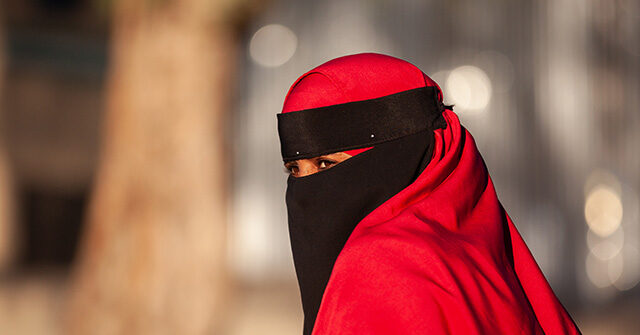
The Dagestan Muftiate, an Islamic religious organization in Russia’s Dagestan region, on Wednesday issued a temporary ban against full-face coverings for women at the request of Russian officials.
The ban was imposed because the terrorists who attacked churches and synagogues in Dagestan last month reportedly discussed using niqab face coverings to disguise themselves and escape after the crime.
WATCH — CNN’s Bergen: If ISIS-K Did Russia Concert Attack, It’s “Very Embarrassing” for Biden on Afghanistan Withdrawal:
The muftiate said the ban would remain in place “until the identified threats are eliminated and a new theological conclusion is reached.”
Dagestan governor Sergei Melikov mentioned the niqab detail soon after the attack and said he was personally opposed to allowing the full-face coverings until the security situation was stabilized. Some influential Russians have called for a nationwide ban on the niqab for security reasons.
The senior Muslim cleric in Dagestan, Mullah Akhmed Abdulayev, suggested that men who did not want their wives to appear in public without full face coverings should keep their women at home for the duration of the security emergency.
Dagestan is a mountainous republic in Russia located along the Caspian Sea. Its population is ethnically diverse but about 95 percent Muslim. The region also boasts small but ancient Christian and Jewish communities.
In this photo taken from video released by The Telegram Channel of the head of Dagestan Republic of Russia on Monday, June 24, 2024, a damaged Star of David is seen on the wall of the the Kele-Numaz synagogue in Derbent after a counter-terrorist operation in republic of Dagestan, Russia. Multiple police officers and several civilians, including an Orthodox priest, were killed by armed militants in Russia’s southern republic of Dagestan, its governor Sergei Melikov said in a video statement. (The Telegram Channel of the head of Dagestan Republic of Russia via AP)
Dagestan has a long history of violent unrest, in part because it is located next to explosive Chechnya. Large numbers of Dagestani militants were recruited by the Islamic State to fight in Syria and Iraq during the 2010s. As recently as October, a Muslim mob rioted at Dagestan’s Makhachkala airport and attacked a plane from Israel. Ironically, none of the 20-plus people hurt in the riot was an Israeli.
On Sunday, June 23, coordinated squads of terrorist gunmen attacked churches, synagogues, and police stations in two Dagestan cities, killing at least 22 people. The dead included police officers, civilians, and a Russian Orthodox archpriest.
Little information has been released by Russian police since the event. Melikov blamed Islamic “sleeper cells” under foreign control for the slaughter. An ISIS-affiliated channel on the Telegram chat platform claimed the Islamic State “inspired” the massacre, but stopped short of describing the killers as Islamic State operatives.
WATCH — Pelosi Calls for FBI Probe into Russia Funding Anti-Israel Protesting in U.S.:
Melikov repeated on Monday that he believes the attack was directed by “international terrorist organizations.”
“No matter how they try to convince us that the events in Dagestan happened internally, I, for one, will never believe this,” he insisted.
Melikov was evasive about exactly who “our direct enemies” orchestrating the attack were, but he made a point of blaming the U.S. and its allies, no matter who actually gave the orders.
“It is not necessary for Western or other instructors to be on the territory of Dagestan, because today these special services and leaders of terrorist organizations use the Internet, social networks, and may well influence both the training and the ideological state of people who are capable of such crimes,” he argued.
Russian officials have more straightforwardly accused Ukraine of orchestrating the attack.